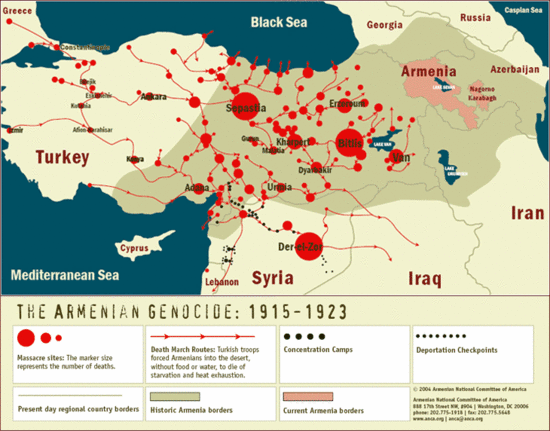 No nation wants to be seen as the precursor to the Nazi’s Holocaust. That is why Turkey lobbied Congress like few other nations to defeat a Congressional resolution that would have described the death of 1.5 million Ottoman Armenians after the collapse of the Ottoman Empire a “genocide.”
No nation wants to be seen as the precursor to the Nazi’s Holocaust. That is why Turkey lobbied Congress like few other nations to defeat a Congressional resolution that would have described the death of 1.5 million Ottoman Armenians after the collapse of the Ottoman Empire a “genocide.”
Armenians state that the Turks orchestrated the massacre. The Turks argue that the deaths were an unfortunate consequence of the driving out of Armenians. The Turks never operated concentration camps like the Nazis. During World War I, the Ottoman Empire’s Armenian community sided with the Turks’ enemy: the Allies. When the war was over and the Allies prevailed, the Turks lost great stretches of their empire. It is certainly understandable that they felt resentment against Armenians whom were living in the Ottoman Empire by cheering its lose. Seeking to ride itself of a what Turks saw as a fifth column, Armenians were forced out of Anatolia over roughly five years during which 1.5 million died in the long journeys often made by foot. The Turks argue that a genocide is an initial organization of death against one group of people, and that the deaths of Armenians while regrettable is the consequence of forced exodus not an organization of massacre. Thus the Turks strongly protest against the application of the word genocide.
But the Armenian-American community is more numerous than the Turkish community, and strongly united and highly mobilized on this issue. And California, home to Speaker of the House Nancy Pelosi, is were a large Armenian diaspora community lives.
Using their political pull, the community got a Congressional House committee to pass a resolution defining the Armenian deaths as a genocide. It does not become law until a full House floor vote and Turkey went to work making sure that vote never comes to pass. How did Turkey do this?:
The genocide question split U.S. leaders. All eight living former secretaries of state at the time sent a letter warning Congress that offending Turkey could have serious diplomatic consequences for the United States. Both Barack Obama and his chief opponent for the Democratic presidential nomination, Hillary Rodham Clinton, were in the Senate; Clinton backed a resolution recognizing the genocide, and Obama made it a campaign pledge.
Turkey’s lobbyists made contact with the executive branch 100 times in a coordinated effort to persuade congressional leaders to squash the resolution. The Livingston Group worked Congress. The firm’s lobbyists contacted the office of Rep. Adam Schiff, D-Calif., author of the resolution, four times on Oct. 4 to arrange a meeting with Turkish Ambassador Nabi Sensoy. A few weeks later, Sensoy was withdrawn in protest of the House’s consideration of the measure.
Turkey didn’t lobby just Congress — the country hired foreign agents to promote the cause with people outside the administration, too. Noam Neusner, who served as a speechwriter for President George W. Bush, worked the powerful Jewish lobby, meeting with an array of groups including the influential American Israeli Public Affairs Committee [9] a combined 96 times to persuade them to oppose the resolution, FARA records show. Turkey was the first Muslim country to recognize Israel, and relations have been generally positive; but in the end, AIPAC supported the resolution.
On Oct. 26, 2007, some sponsors of the resolution backed off a full floor vote, and the legislation never advanced. FARA records quantify the effort Turkey’s lobbyists put into the issue: 673 contacts in a single month, and more than 2,200 in the filings overall — the most of any country.
In all, records show, Turkey spent $4.2 million to mobilize its lobbyists to influence a resolution that hinged on the single word — genocide. Some $1.9 million of that went to DLA Piper [10], a top-50 U.S. law firm that operates globally and has taken on such high-profile cases as the defense of imprisoned Nobel Peace Prize laureate Aung San Suu Kyi in Myanmar. The dispute demonstrates the power of labels — and the lengths to which a country will go to protect its world image.
For members of Congress, it is lobbying that matters not necessarily truth. Besides hired lobbies, the official Turkish lobby is itself very powerful and a many prominent people sit on its board.



